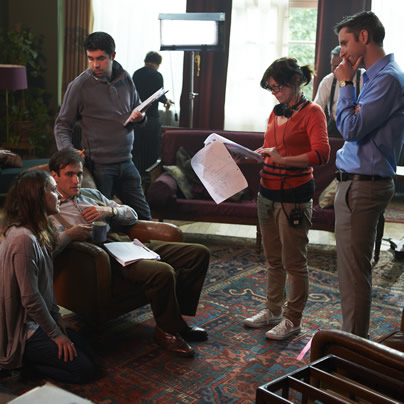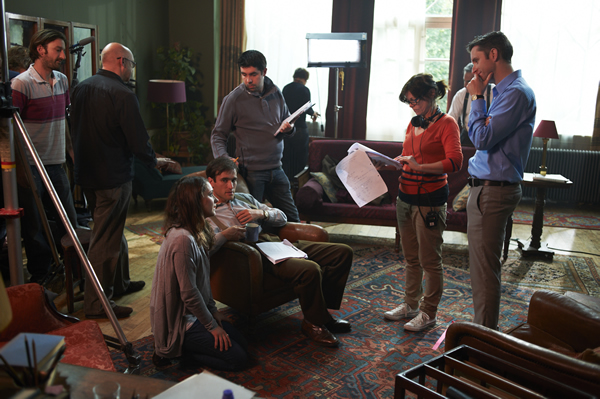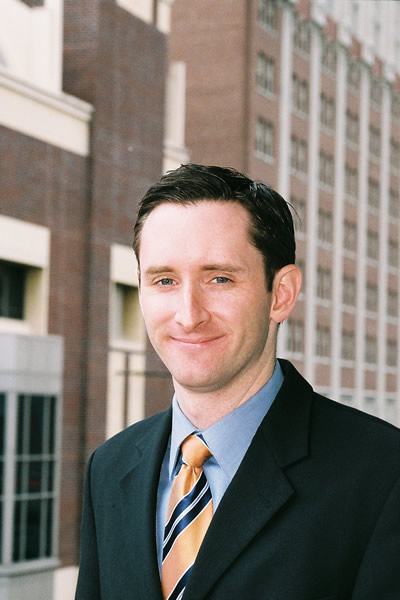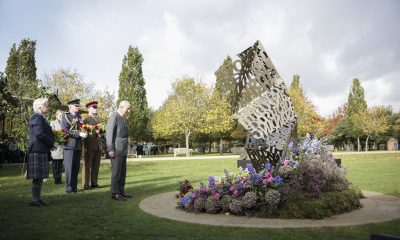Arts & Entertainment
Tragic hero
Film tells story of Alan Turing — from cracking Nazi code, to chemical castration and suicide


Patrick Sammon, right, on the set of his new docu-drama ‘Codebreaker’ in London. (Photo by Marc Sethi)
Scientist cracks codes to help defeat Germany during World War II, essentially laying the groundwork for modern computer science, but is busted for being gay and in 1950s England is chemically castrated and eventually commits suicide.
It’s a tragedy of epic proportions but such is the little-heard biography of Alan Turing. A new 81-minute docudrama about his life called “Codebreaker” debuts next week in Washington.
Novice filmmaker Patrick Sammon — a former executive director of the Log Cabin Republicans — says Turing’s story needs to be told.
“As I sorted through my hundred ideas,” Sammon says, “Turing’s idea quickly came to the top of the pile, because it was an amazing story, and I thought everyone should know about Turing’s contribution to our world. And then I realized there really hadn’t been a film like this done about him.”
The film (turingfilm.com) was released in the U.K. last year. Its U.S. premiere is Wednesday at the Georgetown AMC. It’s sponsored by the D.C. Center and tickets are available to the public (todpix.com/codebreaker). An advance screening and discussion were held last week at the National Press Club on the centenary of Turing’s birth and the film will also screen in New York on Oct. 25. Beyond that, TODpix, a distribution company, is working with grassroots organizations across the country to find audiences for additional showings.
Sammon, who’s gay, hopes to reach pockets of both the LGBT and tech communities to build a demand for additional screenings, culminating in “A Night with Alan Turing,” featuring screenings in 50 cities on Nov. 8.
Turing grew up in England in the early 20th century. He quickly stood out as a bright student and his teachers praised his “considerable powers of reasoning.” He developed a strong bond with fellow student Christopher Morcom. According to David Leavitt, novelist and Turing historian, “Morcom was, I think, more important to Turing than any other human being in his life. Turing was probably, in an adolescent way, quite in love with him.”
When Morcom died at a young age, Turing delved into his work as a sort of tribute to his late friend. As years passed, Turing developed the idea of the computer, broke encrypted German army messages during World War II and laid the groundwork for the future of artificial intelligence and mathematical biology.
Later in life, Turing had an affair with a 19-year-old named Arnold Murray, a friend of whose burgled Turing’s house early in 1952. Turing reported the crime, and the circumstances surrounding it, to the police. At the time, homosexuality was illegal in England and they charged Turing with indecency. Turing opted for hormonal treatment over prison, resulting in serious physical and mental side effects. Shortly after ending treatment, Turing committed suicide at the age of 41.
Sammon moved to Washington in 2003 to become a documentary filmmaker, but his career took a detour when he began working for, and ultimately running, the Log Cabin Republicans, a conservative organization that advocates for equal rights for the LGBT community. During this time, Sammon amassed many ideas for films. When he launched Story Center Productions in 2009, he partnered with a U.K.-based production company to help with his first film, “Codebreaker.”
He spent about six months in London during the production, which he’s been focused on full time since 2010. He factored in some living expenses into the production cost, which was funded largely from Channel 4 in the U.K. and also on his savings. Other donors, foundations and corporations including Intel and Google helped finance the project.
Sammon calls the film a “drama-documentary,” saying, “A third of it is drama, recreation, and then two-thirds is documentary. It’s a good mix of those two elements, and I think they play well together.”
It features a myriad of interviews with Turing’s relatives and associates, historians and industry professionals. His work is widely recognized as the foundation of all modern-day technology. In the film, Google’s Alma Whitten describes his contributions as timeless, saying, “They’re the things that are fundamentally true, so they’re always going to be with us, in the same way that the things that Galileo and Newton contributed to physics are always going to be with us.”
Apple co-founder Steve Wozniak credits Turing with making possible all subsequent technology. “Alan Turing was sort of at the top of everything that ever developed,” Wozniak says in the film. “All the future research that was done by people, building real equipment that can compute.”
The interviews are juxtaposed with dramatizations of therapy sessions from Turing’s last year, while Turing was undergoing chemical castration. Ed Stoppard (“Upstairs, Downstairs”) plays Turing opposite Henry Goodman (“Taking Woodstock”) as Franz Greenbaum, Turing’s psychiatrist and friend.
Production for the dramatizations lasted only five days, but Stoppard’s performance is a stand-out piece of the film. He dramatizes the internal struggle that drove Turing to take his own life. Stoppard’s sometime-sardonic, sometimes-reflective comments mask a pain his character carried with him.
Sammon’s passion for the story stemmed from the injustice Turing faced despite his contributions to society.
“Here you have someone who is one of the key people who helped the Allies win World War II by breaking Germany’s naval enigma code,” Sammon says. “Then you have the technology world really giving Turing credit for creating the intellectual foundation for modern computer science. The paper he wrote in 1936 really laid down the key ideas for the modern computer.”
Sammon goes on to describe the “Shakespearean tragedy” that followed. “In spite of his genius, in spite of his amazing contribution to the war, the fact that he was gay, the government persecuted him because of it.”
During the course of a year of chemical castration, Turing took daily doses of estrogen. Effects of the treatment included shrunken testicles, a loss of his libido, a loss of body hair and the development of breasts. Months after the treatment ended, Turing’s body had not returned to its normal state. Sammon believes Turing elected the hormone therapy, in place of a year in prison, to avoid being taken away from his work.
Sammon, who says he has “a lot of other ideas” for future film projects though he’s focused on the “Codebreaker” distribution for now, says it’s important to recognize the historical accomplishments of the LGBT community and foster a more inclusive society. At the same time, he believes all people, regardless of sexual orientation, should admire Turing as a hero and a genius.
“I admire him very much because he was unconventional,” Sammon says. “I respect Turing for the fact of how unconventional he was, and he wasn’t afraid to be different. The sad part is society, at the time, didn’t have tolerance for differences.”
Leavitt describes Turing as a tragic hero we must learn from.
“His refusal to compromise or lie, under such circumstances, was nothing less than heroic — yet we must remember that, as a consequence of his heroism, he was erased from history for many years. Nor is the institutionalized hatred of gay men and lesbians any less of a reality today than it was in 1953. Even as we honor Alan Turing, we must be vigilant. We must not let ourselves lapse into complacency. This could happen again.”
Books
Love or fear flying you’ll devour ‘Why Fly’
New book chronicles a lifetime obsession with aircraft

‘Why Fly’
By Caroline Paul
c. 2026, Bloomsbury
$27.99/256 pages
Tray table folded up.
Check. Your seat is in the upright position, the airflow above your head is just the way you like it, and you’re ready to go. The flight crew is making final preparations. The lights are off and the plane is backing up. All you need now is “Why Fly” by Caroline Paul, and buckle up.

When she was very young, Paul was “obsessed” with tales of adventure, devouring accounts written by men of their derring-do. The only female adventure-seeker she knew about then was Amelia Earhart; later, she learned of other adventuresome women, including aviatrix Bessie Coleman, and Paul was transfixed.
Time passed; Paul grew up to create a life of adventure all her own.
Then, the year her marriage started to fracture, she switched her obsession from general exploits to flight.
Specifically, Paul loves experimental aircraft, some of which, like her “trike,” can be made from a kit at home. Others, like Woodstock, her beloved yellow gyrocopter, are major purchases that operate under different FAA rules. All flying has rules, she says, even if it seems like it should be as freewheeling as the birds it mimics.
She loves the pre-flight checklist, which is pure anticipation as well as a series of safety measures; if only a relationship had the same ritual. Paul loves her hangar, as a place of comfort and for flight in all senses of the word. She enjoys thinking about historic tales of flying, going back before the Wright Brothers, and including a man who went aloft on a lawn chair via helium-filled weather balloons.
The mere idea that she can fly any time is like a gift to Paul.
She knows a lot of people are terrified of flying, but it’s near totally safe: generally, there’s a one in almost 14 million chance of perishing in a commercial airline disaster – although, to Paul’s embarrassment and her dismay, it’s possible that both the smallest planes and the grandest loves might crash.
If you’re a fan of flying, you know what to do here. If you fear it, pry your fingernails off the armrests, take a deep breath, and head to the shelves. “Why Fly” might help you change your mind.
It’s not just that author Caroline Paul enjoys being airborne, and she tells you. It’s not that she’s honest in her explanations of being in love and being aloft. It’s the meditative aura you’ll get as you’re reading this book that makes it so appealing, despite the sometimes technical information that may flummox you between the Zen-ness. It’s not overwhelming; it mixes well with the history Paul includes, biographies, the science, heartbreak, and exciting tales of adventure and risk, but it’s there. Readers and romantics who love the outdoors, can’t resist a good mountain, and crave activity won’t mind it, though, not at all.
If you own a plane – or want to – you’ll want this book, too. It’s a great waiting-at-the-airport tale, or a tuck-in-your-suitcase-for-later read. Find “Why Fly” and you’ll see that it’s an upright kind of book.
The Blade may receive commissions from qualifying purchases made via this post.
Theater
Out actor Kevin Cahoon on starring role in ‘Chez Joey’
Arena production adapted from Broadway classic ‘Pal Joey’

‘Chez Joey’
Through March 15
Arena Stage
1101 Sixth St., S.W.
Tickets start at $93
Arenastage.org
As Melvin Snyder in the new musical “Chez Joey,” out actor Kevin Cahoon plays a showbiz society columnist who goes by the name Mrs. Knickerbocker. He functions as a sort of liaison between café society and Chicago’s Black jazz scene circa 1940s. It’s a fun part replete with varied insights, music, and dance.
“Chez Joey” is adapted from the Broadway classic “Pal Joey” by Richard Rodgers and Lorenz Hart. It’s inspired by John O’Hara’s stories based on the exploits of a small-time nightclub singer published in The New Yorker.
A warm and humorous man, Cahoon loves his work. At just six, he began his career as a rodeo clown in Houston. He won the Star Search teen division at 13 singing songs like “Some People” from “Gypsy.” He studied theater at New York University and soon after graduating set to work playing sidekicks and comedic roles.
Over the years, Cahoon has played numerous queer parts in stage productions including “Hedwig and the Angry Inch,” “La Cage aux Folles,” “Rocky Horror” as well as Peanut in “Shucked,” and George the keyboardist in “The Wedding Singer,” “a sort of unicorn of its time,” says Cahoon.
Co-directed by Tony Goldwyn and the great Savion Glover, “Chez Joey” is a terrific and fun show filled with loads of talent. Its relevant new book is by Richard Lagravenese.
On a recent Monday off from work, Cahoon shared some thoughts on past and current happenings.
WASHINGTON BLADE: Is there a through line from Kevin, the six-year-old rodeo clown, to who we see now at Arena Stage?
KEVIN CAHOON: Anytime I want to land a joke in a theater piece it goes back to that rodeo clown. It doesn’t matter if it’s Arena’s intimate Kreeger Theatre or the big rodeo at the huge Houston Astrodome.
I was in the middle stadium and there was an announcer — a scene partner really. And we were doing a back and forth in hopes of getting laughs. At that young age I was trying to understand what it takes to get laughs. It’s all about timing. Every line.
BLADE: Originally, your part in “Chez Joey” Melvin was Melba who sings “Zip,” a clever woman reporter’s song. It was sort of a star feature, where they could just pop in a star in the run of “Pal Joey.”
CAHOON: That’s right. And in former versions it was played by Martha Plimpton and before her Elaine Stritch. For “Chez Joey,” we switched gender and storyline.
We attempted to do “Zip” up until two days before we had an audience at Arena. Unexpectedly they cut “Zip” and replaced it with a fun number called “I Like to Recognize the Tune,” a song more connected to the story.
BLADE: Wow. You must be a quick study.
CAHOON: Well, we’re working with a great band.
BLADE: You’ve played a lot of queer parts. Any thoughts on queer representation?
CAHOON: Oh yes, definitely. And I’ve been very lucky that I’ve had the chance to portray these characters and introduce them to the rest of the world. I feel honored.
After originating Edna, the hyena on Broadway in “The Lion King,” I left that to do “Hedwig and the Angry Inch” as standby for John Cameron Mitchell, doing one show a week for him.
Everyone thought I was crazy to leave the biggest musical of our time with a personal contract and getting paid more money that I’d ever made to get $400 a week at the downtown Jane Street Theatre in a dicey neighborhood.
At the time, I really felt like I was with cool kids. I guess I was. And I never regretted it.
BLADE: When you play new parts, do you create new backstories for the role?
CAHOON: Every single time! For Melvin, I suggested a line about chorus boys on Lakeshore Drive.
BLADE: What’s up next for Kevin Cahoon?
CAHOON: I’m about to do the New York Theatre Workshop Gala; I’ve been doing it for nine years in a row. It’s a huge job. I’ll also be producing the “Cats: The Jellicle Ball” opening on Broadway this spring; it’s a queer-centric uptown vogue ball with gay actor André de Shields reprising his role as “Old Deuteronomy.”
BLADE: There’s a huge amount of talent onstage in “Chez Joey.”
CAHOON: There is. I’m sharing a dressing room with Myles Frost who plays Joey. He won accolades for playing Michael Jackson on Broadway. We’ve become great friends. He’s a miracle to watch on stage. And Awa [Sal Secka], a D.C. local, is great. Every night the audience falls head over heels for her. When this show goes to New York, Awa will, no doubt, be a giant star.
BLADE: Do you think “Chez Joey” might be Broadway bound?
CAHOON: I have a good feeling it is. I’ve done shows out of town that have high hopes and pedigree, but don’t necessarily make it. “Chez Joey” is a small production, it’s funny, and audiences seem to love it.

The Capital Pride Alliance held the annual Pride Reveal event at The Schuyler at The Hamilton Hotel on Thursday, Feb. 26. The theme for this year’s Capital Pride was announced: “Exist. Resist. Have the audacity!”
(Washington Blade photos by Michael Key)












































